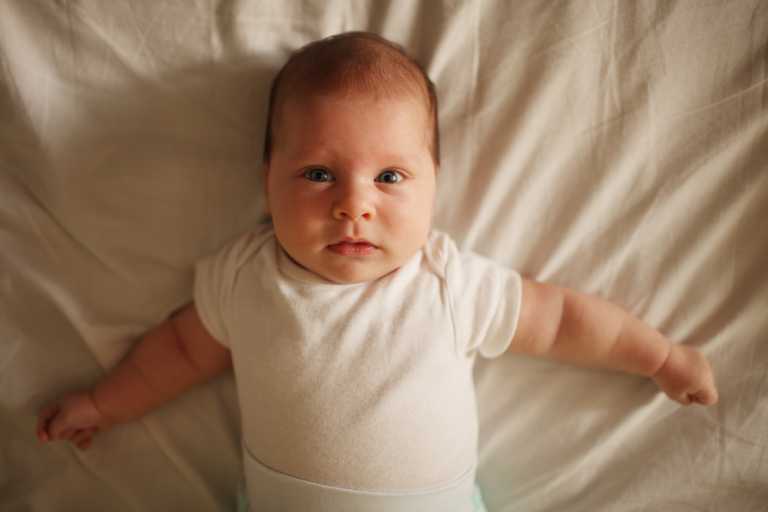Have you caught your baby shaking their head from side to side and feel a little anxious about what it means? You’re definitely not alone! As parents, we want to ensure our little ones are healthy and happy, so any unusual behavior can trigger worry.
Here’s the good news – in most cases, head shaking is completely normal and harmless. It could be your baby’s way of self-soothing, having fun, or simply showing off their new moves.
However, it’s important to be aware of any accompanying symptoms, such as developmental delays or a lack of eye contact, as these could be signs of something more serious.
Here’s everything you need to know about head shaking in babies, including common causes, when to seek medical attention, and some practical tips to stop the behavior. Let’s dive in and ease your worries!
Is It Normal for a Baby to Shake Their Head From Side to Side?
Head shaking is a common behavior most babies pick up at some point. If nothing else seems amiss, your little one’s new habit is probably due to one of the following causes:
Trying to Latch
Full-term babies are born with a rooting reflex. This basic survival instinct allows them to turn in the direction of anything touching their lips. The idea is that it will help them find a nipple and latch.
As your baby gets stronger, this rooting can become more pronounced, and you may notice them enthusiastically shaking their head from side to side when looking for a breast or bottle.
Self Soothing
Rocking your head from side to side might seem like a strange way to get to sleep, but if you think about it, it makes sense.
When your baby was in the womb, they would have been rocked to sleep as you walked. This can make trying to fall asleep in a stationary crib a little tricky. So your little one may be trying to simulate motion, and moving their head is an easy way to do it.
Following Sounds
At 2 months old, your baby may learn how to turn toward sound. If they’re in a room with multiple noise sources, the shaking may just be them figuring out where it’s all coming from.
Experimentation
Every new skill is exciting and brings new sensations. So, once your baby discovers they can turn their head, they’ll want to practice and show it off.
Imitation
Your baby will learn partly by imitating your actions. If you’ve been playing games where you shake your head or try to teach yes and no by nodding, they may be copying you.
Playing
Rocking your head back and forth can make you dizzy, which your baby might find funny.
Saying No
Of course, shaking your head can also mean no. However, your little one is unlikely to develop this communication skill before they’re a year old.
When to Worry About Your Baby Shaking Their Head
Very occasionally, your baby shaking their head could be a sign of a medical issue. The golden rule is to follow your instinct; if you feel like something is wrong, get it checked out. Your doctor will be happy to see you, whether they catch a problem early or just put your mind at ease.
Here are the potential conditions and warning signs you should look out for.
Ear Infection
Head shaking can be a symptom of an ear infection as they try to move away from the pain.
Warning signs:
- Fever
- Ear tugging
- Unusually sleepy or lethargic
- Crying more or at a higher pitch than usual
Myoclonic Epilepsy
This type of epilepsy presents as head nodding, jerks, or spasms, which can happen several times a day.
The good news is that, in most cases, the seizures will stop between 6 months and 5 years with no lasting effect on development.
However, they do need to be evaluated by a doctor and may require medication.
Warning Signs:
- Movements are jerky
- It involves arms, and sometimes their legs shake too
- Occasionally, their eyes roll upwards
- It happens several times a day
Shuddering Attacks
If your baby’s head, neck, and arms suddenly stiffen and then shudder for a few seconds, it may be a shuddering attack. Although the name sounds scary, they aren’t harmful, and your little one should grow out of them in a few months.
Warning signs:
- Your little one’s arms shake as well
- The episodes come on suddenly
- Your baby isn’t upset by it but may look surprised
Neurological Disorders
Occasionally, the shaking could be a sign of a neurological disorder, particularly if it seems involuntary.
Warning signs:
- Movements are involuntary
- Missing developmental milestones
- Signs of illness, injury, or a fall. Look for bruises, scrapes, etc.
Autism
Rarely, head shaking can be a sign of autism, but only if accompanied by other symptoms. On its own, shaking is not a good indicator of autism.
If your baby also shows some of these other warning signs, consult your pediatrician.
Warning Signs:
- Shaking is prolonged
- Head banging
- Lack of eye contact or unusual gaze
- Unresponsive to name, parent’s voice, or other sounds
- Developmental delays
- Regression in development milestones like verbal or social skills
- Obsessive repetition of behaviors
- Over or under-sensitivity to things like sounds, touch, or taste
- Repetitive movements, like hand flapping
- A sibling has autism
What to Do If Your Baby Keeps Shaking Their Head
While most cases are no cause for concern, head shaking can cause dizziness and bald spots. So, it’s probably not something you want to encourage. Here’s what you can do about your little one’s new habit.
Ignore the Action
Your baby loves your attention, so they’ll repeat actions that get a response. If you copy their shake or pay them a lot of attention when it happens, they’ll keep doing it.
Instead, ignore the movement and give them lots of praise for a different skill.
Make Sure They Are Safe
Shaking can cause dizziness, which could lead them to topple from sitting or tummy time positions. So, ensure hard objects are out of the way, and you’re ready to catch them.
Create a Calm Environment
Often, noise and overstimulation are the culprits. Try moving your baby to a quiet, calm environment with dim lighting. They may just need a nap.
Baby Massage
Massage is a great way to soothe your baby and may provide the stimulation they’re looking for.
Make a Note
Keep a note of how many times a day they shake their head and how long it lasts. Your doctor will need this information if you become concerned.
Try to Record It
Even better than a written record is a video recording. This will help your doctor make a diagnosis if there’s an issue.
Don’t panic
One of your biggest worries might be shaken baby syndrome, where your baby’s head shaking causes an injury.
Fortunately, it’s not possible for your baby to give themselves shaken baby syndrome. The only troublesome effect they might have is a bald spot where they’ve rubbed their hair against their bedsheet.




